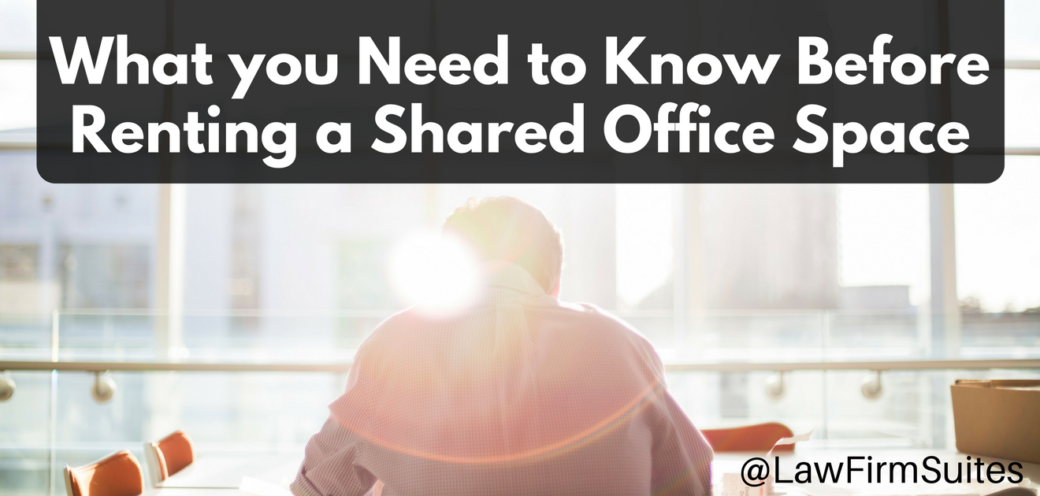You need to know these four things about your law practice before renting a shared office space if you want to find the best balance of flexibility and stability for your firm.
Moving a law office is not a quick or easy process and it always results in lost billable time. We have found that many lawyers prefer to move their firm’s office no more than once every five years. But this can be tricky. For many attorneys, your practice will likely look very different in five years.
Finding an office space that has that perfect mix of flexibility and stability can be difficult. Doing so requires having a solid understanding of these four things:
1. Which working environment will make you most productive?
Your physical workspace can make a meaningful difference in your productivity. Some attorneys thrive off the buzzing energy of a busy office. Others want to work in an office that feels like a Midtown shared law office: professional and quiet, but not dead.
Give some thought about the different offices that helped your productivity. Was the culture collaborative? Bland? Quiet? Lud? Were people friendly or did they stick to themselves? What was your office like? How much space did you have? How did it feel, was it roomy or cramped? Too bright and colorful or plain and minimal?
When selecting an office for your firm, we suggest that you consider the following items, which are listed in priority order:
1. Building location. Look for something that is not only convenient to you but also your clients.
2. Your physical workspace. You can sublease office space in the nicest building, but if your workspace is a hovel, then you will not be happy or productive.
3. The conference rooms. Next to your office, you’ll probably spend the most time in conference rooms. Make sure they will meet your typical needs, and more importantly, will be available when you need them.
4. The office suite, including reception. If you had to choose between a workspace that makes you happy or a reception area with designer chairs and modern art, go with the former.
5. The building lobby. Most buildings where shared office spaces are located have decent lobbies. The market simply demands it. Frankly, the standard for building lobbies is that there should be nothing offensive about it (odors, disrepair, etc.).
6. The building exterior. Frankly, for attorneys the exterior design of the building is irrelevant. The only people who look up in New York City are tourists and architects.
2. What’s your actual budget?
Our experience is that most law practices can support considerably more in rent than what their attorneys’ think. And we’re not saying this because we are landlords and want you to spend more money.
But if you are choosing between an office that you really like but that stretches the budget, or one that doesn’t get you excited but is within the budget, go with the bigger office (within reason of course).
Time and time again we’ve seen that attorneys who take the nicer space play a “bigger game”. The attorneys who stretch not only find a way to pay for the extra expense but they grow their practices much more rapidly.
So, as you figure out your budget, come up with a range the high point of which may be a stretch for you. Then go shopping for space.
3. What services are a must?
Once you know your budget, think about all the services your firm needs (internet, phone service, copy machines, reception services, HVAC, cleaning, kitchen pantry, etc.). It’s best to group these services into three categories:
1. What you absolutely require.
2. What would be nice to have.
3. What you can definitely live without.
When looking at different office options, in order to compare “apples to apples” you need to really understand what is included as part of the deal. If the services your firm absolutely requires are not included (or are inadequate), then you will have to pay for these things on your own. One or two of these items can significantly increase the cost of your law office rental.
4. Who do you want to work with?
Law is a profession that is most successfully practiced in collaboration with other lawyers. The ability to brainstorm and get advice about legal issues or practice strategies is essential to everyday practice.
Your firm may be big enough to have this collaborative environment on its own. Maybe you just don’t care to be around other lawyers. For the rest of us, it makes the most sense to find shared office space.
But who you find in a shared office space may be a mixed bag.
In a typical Manhattan law office sublet, you may find lawyers who are open to collaboration. These are typically office situations where there are a number of small law firm subtenants. What’s more common though is sublessors who simply want you to pay timely and leave their attorneys alone so they can bill.
Executive suites can be a more collaborative environment, but unless you rent from an executive suite for law firms, you may find an odd mix of clientele ranging from traders to tailors. Different professionals have different work habits that don’t always lend well to sharing space attorneys, who require quiet and, above all, privacy.


